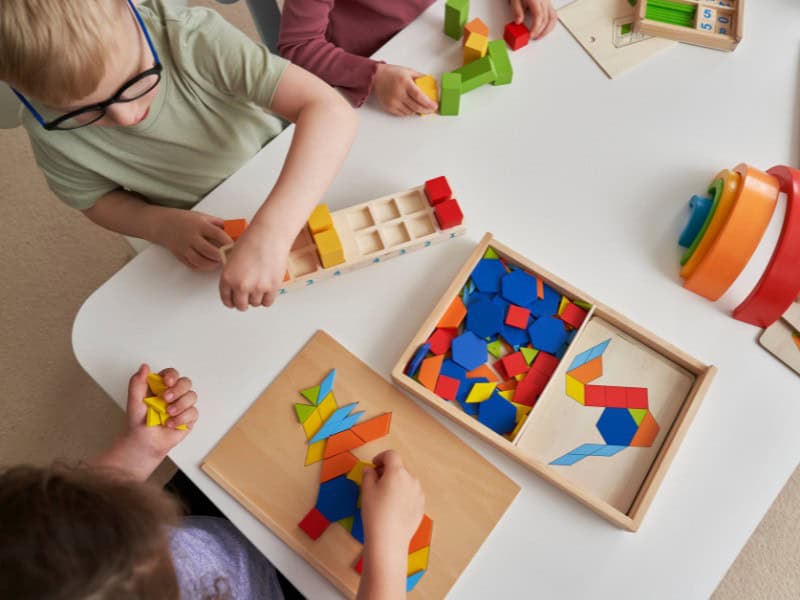Montessori Parenting: A Guide to Raising Confident, Independent, and Curious Kids
When most people hear “Montessori,” they picture a beautifully organized preschool filled with wooden toys, soft lighting, and children working quietly with hands-on materials. But Montessori is more than an educational method—it’s a way of thinking about childhood and a philosophy that can shape how we parent.

Play. Learn. Thrive.™ only endorses products we authentically love and use. Some of the product links in this post may be affiliate links. That means that if you click them and make a purchase, this site makes a commission. Play. Learn. Thrive.™ is also an Amazon Associate. As an Amazon Associate, we earn from qualifying purchases. It will have no impact on the price you pay or the experience of your purchase.
Montessori parenting is about fostering independence, respecting the child, and creating an environment that supports their natural curiosity and development. It goes beyond the classroom and influences everything from how we set up our homes to how we speak to our children and guide them through life.
For those of you how don't know me, I’m Alanna Gallo, a former teacher with a master’s in education who saw firsthand how kids were losing confidence, independence, and their natural love of learning.

I left the classroom to help parents raise curious, capable, and screen-conscious kids in a world that doesn’t make it easy. My work has been featured in major media outlets, and I’m here to give you real, research-backed advice—without the guilt trips or unrealistic expectations.
In this guide, we’ll break down the core principles of Montessori parenting, what it looks like in practice, and how you can incorporate it into your home—even if your child doesn’t attend a Montessori school.
What Is Montessori Parenting?
Montessori parenting is rooted in the work of Dr. Maria Montessori, an Italian physician and educator who developed a child-centered approach to learning in the early 1900s. She observed that children learn best when given freedom within limits, respect, and an environment that supports their independence.
Rather than seeing children as empty vessels to be filled with knowledge, Montessori philosophy recognizes that children are naturally driven to learn, explore, and master their world—if we give them the right conditions.
Montessori parenting isn’t about following rigid rules or buying expensive toys. It’s about shifting your mindset and creating an environment where your child can thrive. Let’s explore what that looks like in daily life.
Our Guide into Montessori Parenting
1. Respecting the Child as an Individual
Maria Montessori believed that respect is the foundation of everything when it comes to raising children. This means treating our children as capable, competent individuals who deserve autonomy and trust.
How to Apply This at Home:
Give them time to do things on their own. Instead of stepping in to “fix” or speed up the process, let your child try first—whether it’s putting on their shoes, pouring a drink, or cleaning up a spill.
Use respectful language. Instead of saying, “You’re too little,” try, “Would you like some help with that?” Instead of “You’re making a mess,” try, “Let’s clean this up together.”

Listen to their thoughts and feelings. Even young children deserve to have their voices heard. When they express frustration, excitement, or sadness, acknowledge it rather than dismissing it.
Respecting children doesn’t mean letting them do whatever they want—it means treating them with the same dignity and patience we would offer any other human being.
2. Creating a Montessori-Friendly Home
Montessori environments are designed for independence, and you can bring this philosophy into your home by making small adjustments to encourage self-sufficiency.
Setting Up a Child-Centered Environment
Child-Sized Furniture – A small table and chairs allow kids to work and eat independently. A low shelf with a limited selection of toys invites engagement without overwhelming choices.
Accessible Storage – Store clothes in drawers or baskets at child height so they can dress themselves. Keep snacks on a low shelf in the fridge or pantry so they can get their own food.

Tools for Independence – Provide a step stool for handwashing, a small broom for sweeping, and real (but safe) kitchen tools for cooking.
When children feel capable in their space, they naturally take on more responsibility and develop confidence in their abilities.
3. Encouraging Hands-On, Real-Life Learning
Montessori learning is experiential—children learn best when they can touch, manipulate, and explore.
Ways to Support Hands-On Learning at Home
Cooking Together: Involve your child in meal prep—washing vegetables, slicing bananas with a child-safe knife, or stirring batter. This builds motor skills, patience, and confidence.
Practical Life Skills: Allow children to help with real tasks like sweeping, folding laundry, watering plants, and washing windows. These activities develop coordination, responsibility, and self-worth.
Outdoor Exploration: Instead of relying on structured worksheets, encourage real-world learning—collecting leaves, identifying birds, or tending a small garden.
Rather than “teaching” children, Montessori parenting focuses on guiding them toward discovery and letting them engage deeply with their environment.
4. Following the Child as Their Leader
In Montessori philosophy, the child is the leader of their learning. As parents, our role is not to dictate what or when they should learn but to observe and understand their developmental stage and provide the right opportunities at the right time.
This approach is rooted in the concept of sensitive periods—windows of time when a child is particularly receptive to acquiring a certain skill or knowledge. These periods emerge naturally, and when we recognize them, we can introduce meaningful experiences that align with their current needs and interests.
How to Truly Follow the Child
Observe First, Act Second – Instead of assuming what your child should be learning, take time to watch their behaviors, play, and choices. Are they repeatedly stacking objects? They may be in a sensitive period for order and spatial relationships. Are they constantly touching letters? They may be ready for early literacy.
Know the Sensitive Periods – Dr. Montessori identified key sensitive periods, including movement, language, order, and sensory refinement. When we understand these, we can introduce materials and experiences at the moment when the child is most ready to absorb them.
Provide the Right Environment – Instead of teaching through direct instruction, prepare the environment to allow self-directed learning. A child interested in letters may gravitate toward a sandpaper letter tray. A toddler in a movement-sensitive period will benefit from a low climbing structure.
Examples of Following the Child with Purpose
If your child is repeatedly looking at the night sky, they may be entering a sensitive period for discovery. Instead of pushing random space facts, provide hands-on experiences: a simple model of the solar system, a trip to a planetarium, or time spent stargazing.
If your child is obsessed with tiny details like bugs, they may be refining their senses. Provide magnifying glasses, nature books with real photographs, and opportunities to observe insects in their natural habitat.

If your child hums tunes constantly and repeats rhythmic patterns, they may be in a sensitive period for auditory processing. Provide real (not toy) instruments, allow freedom to explore different genres, and create a space where music is a natural part of the day.
Following the child in the Montessori sense means being deeply in tune with their development rather than simply responding to surface-level interests. When we observe, prepare the environment, and introduce concepts at the right time, we honor the child's innate ability to lead their own learning journey.
5. Rethinking Discipline: Connection Over Punishment
Montessori discipline is about guidance rather than punishment. Instead of using time-outs, bribes, or punishments, Montessori parents use natural consequences, redirection, and connection.
Montessori-Inspired Discipline Strategies:
Set Clear Expectations: Instead of saying, “Don’t run inside!”, say, “Inside, we walk. Outside, you can run.”
Validate Emotions: Instead of “You’re fine! Stop crying,” try, “I see you’re upset. Would you like a hug or some space?”
Offer Choices: Instead of demanding compliance, provide options: “Would you like to put your shoes on first or your jacket?”
This approach builds emotional intelligence and teaches children to manage their feelings rather than simply obeying out of fear.
Ready to Cut Back on Screen Time?

Our free Screen-Free Starter Kit gives you gentle, research-backed strategies to reduce screen time and reconnect with your child—without guilt, tears, or power struggles.
✨ Create a calmer, more connected home—starting today.
6. Limiting Screens & Encouraging Meaningful Play
Montessori philosophy values real-world experiences over passive screen time. While technology has its place, excessive screen use can disrupt focus, creativity, and deep play.
Instead, Montessori homes prioritize:
Books & Storytelling – Reading together builds language skills and emotional connection.
Open-Ended Play – Toys like wooden blocks, art supplies, and sensory bins invite creativity.
Time Outdoors – Nature play promotes exploration, physical health, and independence.
Screen-free, hands-on experiences help children develop real-world skills and imagination—things no app can replace.
7. Modeling Lifelong Learning & Curiosity
Children learn by watching us. In a Montessori home, parents model curiosity, problem-solving, and a love of discovery.
Explore new places together.
Read books and share your excitement about learning.
Ask questions aloud: “I wonder why leaves change colors in fall. Let’s find out!”
When we embrace learning as a joyful process, our children absorb that mindset and carry it with them for life.
Inspired by this post? Be sure to subscribe download my free Screen-Free Starter Kit! For more insights and resources on raising confident, lifelong learners, be sure to follow me on Instagram – can't wait for you to join me!







